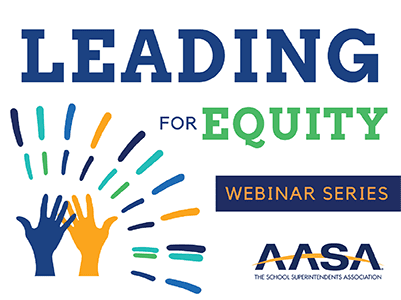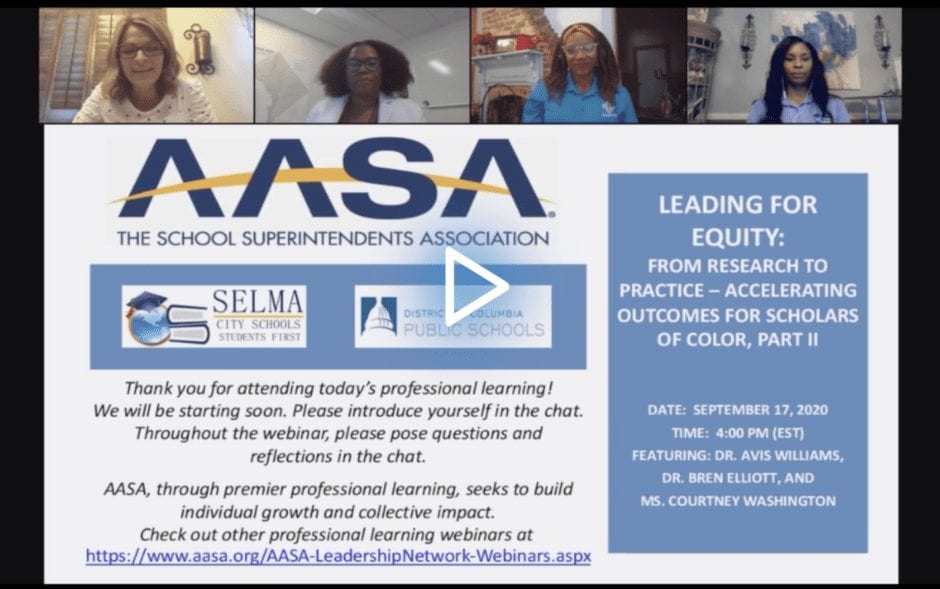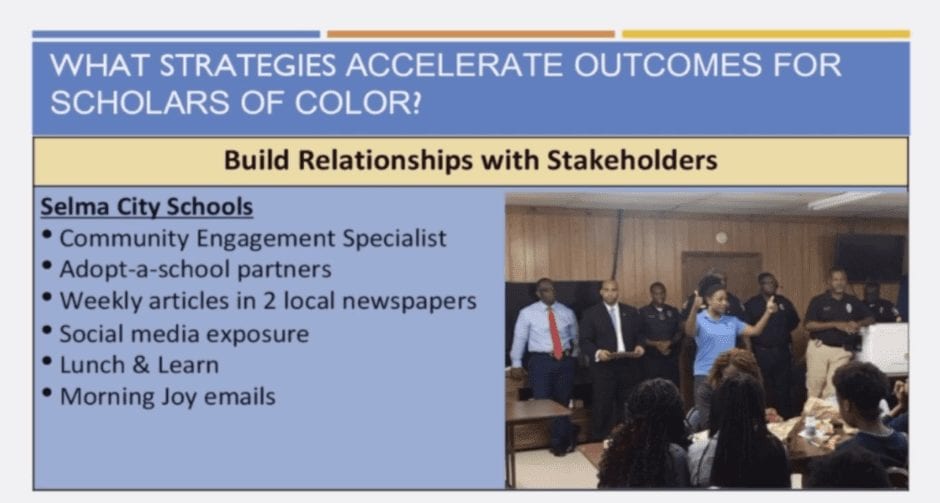Pursuing Educational Equity in Selma: Part 2
By Stacey Pusey
Achieving educational equity doesn’t just happen when schools change their expectations and goals in the classroom. Support and understanding from all stakeholders, including families, local businesses, elected officials, etc., is essential to ensuring everyone in the community is working towards the same goal. During the edWebinar, “Leading for Equity: From Research to Practice – Accelerating Outcomes for Scholars of Color, Part II,” hosted by AASA, The Superintendents Association and AASA’s Leadership Network, the presenters continued their exploration of strategies discussed in Part I and how leaders in the Selma City Public Schools are mobilizing their community in pursuit of educational equity.
Strategy 4: Provide PD to Build Cultural Proficiency
While teachers and staff agree on the value of educational equity, they need a deeper understanding in order to combat it in the classroom. “First,” said Dr. Bren Elliott, Chief School Improvement and Supports Officer for District of Columbia Public Schools, “everyone needs foundational training in the origins of racism, how bias takes root in the classroom, and the negative impact it has on how we treat and what we expect of children. Then, schools can build their capacity to be equity leaders and understanding of how to put strategy into practice. Most important, develop a cohort of equity leaders so they can support each other.”
At Selma, this work began with creating safe workspaces for staff. “Only then,” said Dr. Avis Williams, Superintendent of Selma City Public Schools, “employees start to have those uncomfortable conversations surrounding racism and education.” One way the district did this was to have poverty simulations. They gathered local partners (bankers, healthcare providers, etc.) to participate and join the conversation so teachers could get a better understanding of how poverty can impact a student’s daily life. According to Courtney Washington, Community Engagement Specialist at Selma City Public Schools, the exercises helped develop empathy among teachers and staff so that they could offer stronger support to students and families.
Strategy 5: Build Relationships with Stakeholders
Essentially, said Dr. Elliott, equity cannot be work that you do to stakeholders—it’s work that you must do with them. Include a variety of stakeholders (e.g., board members, businesses, parents) on committees and task forces. Give them opportunities to co-lead, provide input, and influence equity programs.
For Dr. Williams, the initial step in Selma was obvious—she needed to improve the public perception of the district. People outside the school buildings were writing their narrative, and those stories were often incomplete and inaccurate. She hired a community engagement specialist to take charge of those essential relationships. In addition, Dr. Williams writes weekly articles for two local newspapers to share what’s happening with Selma. They’re both celebrations of the school and discussions of their needs. And, Dr. Williams sends daily “Morning Joy” emails to all employees, board members, and interested stakeholders. Similarly, Washington increased the school’s social media presence, so the district was controlling the narrative on multiple platforms.
In her new role as Community Engagement Specialist, Washington focused on finding a way to sustain current community partnerships and create new ones. The result, Adopt-A-School, provides a structured pathway for partnerships. Elected officials, faith-based organizations, local businesses, and other community members work one-on-one with students and support teachers, building their investment in the school’s success.
Strategy 6: Work with Elected Officials to Prioritize Equity
The last strategy seems obvious—make sure the government at all levels understands your district’s goals and how they can support you. Dr. Elliott recommends frequent meetings and updates so they understand your progress and needs at every stage. In Selma, these partnerships have extended beyond providing information to the officials, but finding out how the district can support the community in other ways. For instance, they created a Census Committee to help increase participation, which is typically low in the county. As low turnout can impact future community and school funding, the district partnered with officials and local businesses to bring people to Selma High School to complete the census.
While achieving educational equity is an ongoing process, by employing strategies that involve stakeholders from every part of the community, leaders at Selma hope to have an army joining and supporting Team Selma.
Read the article on Part I of this edWebinar here.
This edWeb broadcast was hosted by AASA, The Superintendents Association and AASA’s Leadership Network, providing premier professional learning for educational leaders.
About the Presenters
Dr. Avis Williams is Superintendent of Selma City Schools where there are stated goals for Equity and Joy in preparing the Whole Child. Dr. Williams served in leadership positions in the U.S. Army, as an entrepreneur and school administrator. As Executive Director of Instruction in North Carolina, she led instruction for over 60 schools. Before moving to Selma, she served as the assistant superintendent for curriculum in Tuscaloosa City Schools. Dr. Williams was awarded the Marbury Technology Innovation Award by the Alabama State Department of Education in 2011 as a principal and in 2019 as the superintendent. A finalist for Alabama State Superintendent of the Year in 2019, Dr. Avis Williams is humbled and honored to be a part of the Historic Selma community and to serve as Superintendent of Selma City Schools.
Dr. Bren Elliott has a 25-year proven track record of significantly impacting academic achievement and stakeholder engagement in public education. She has worked as a teacher, principal, assistant superintendent, and now as Chief Improvement and Supports Officer for District of Columbia Public Schools (DCPS) in Washington, DC. Dr. Elliott is a reflective practitioner who previously served as Chief Equity Officer for DCPS, overseeing leader professional development, student support systems, and the staff evaluation system. Dr. Elliott is a passionate scholar and practitioner regarding school culture, social-emotional learning, and equity initiatives.
Courtney Washington joined Selma City Schools in 2018 as the Community Engagement Specialist. Ms. Washington leads the effort to tell the story of Selma City Schools by engaging scholars, parents, and community partners through various mediums including district newsletters, social media, and community forums.
About the Host
Kristi Wilson has served as Superintendent of the Buckeye Elementary School District in Buckeye, Arizona for the past eight years. Prior to her Superintendency, Kristi served as an assistant superintendent, executive director, special education director, school administrator and teacher, and adjunct professor. Kristi is President of the American Association of School Administrators (AASA), President of the National Minority Student Achievement Network (MSAN), serves on the Executive Board of Arizona’s Business and Education Coalition (ABEC), and is the Immediate Past President of the Buckeye Lion’s Club. She is a past winner of the Arizona Superintendent of the Year, Arizona PTA Honorary Lifetime Achievement Award, and VHI Save the Music National Superintendent of the Year.
Join the Community
Leading for Equity is a free professional learning community on edWeb.net for school and district leaders who face many challenges leading schools and driving school improvement for all students, especially now with COVID-19.
The AASA Leadership Network drives superintendent success, innovation and growth, shaping the future of public education while preparing students for what’s next. We are the largest, most diverse network of superintendents in America. Passionate and committed, we connect educational leaders to the professional learning, leadership development, relationships and partnerships they need to ensure a long career of impact.
Stacey Pusey is an education communications consultant and writer. She assists education organizations with content strategy and teaches writing at the college level. Stacey has worked in the preK-12 education world for 20 years, spending time on school management and working for education associations including the AAP PreK-12 Learning Group. Stacey is working with edWeb.net as a marketing communications advisor and writer.







Comments are closed.